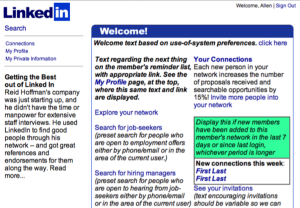Late last year, CNN Money reported that the national unemployment rate fell to 5.1%, nearly half of the 10% peak during the Great Recession. No matter what the unemployment rate is, job hunting is always a pain point for seekers and seek-ees. There is an age-old expression that what you know is far less important than who you know when applying for work. Though it may not be much easier than it was in the good ol’ days, we now find ourselves with more readily accessible opportunities through ever-growing social networks on and offline.
In the early 90s, well before the recession and just as the internet was rapidly expanding, Stanford graduate Reid Hoffman knew the importance of software, but, he told CNN Money, “I realized I wanted to have a much broader relevance in people’s lives. Because I had been at Stanford, I thought about starting a software company. Software reaches millions of people. I networked my way to a couple of different venture capitalists. They said, ‘Have you shipped software before? You’re asking us to invest millions of dollars in your company. You’ve done this before, yes?’ I said, ‘No, not really.’ And they said, ‘Go get a job first.’”

So he did, and he used his network to do so. Eventually, he went to work for Apple and Fujitsu before launching his own social-based company, aptly named Socialnet. Hoffman has described Socialnet as an application to connect people, with a focus on online dating, professional networking, finding roommates and even included something called Just Play for finding Tennis Players. In the end, Socialnet was a learning experience for Hoffman, he told Business Insider that it gave him scars and spilled a lot of blood, but taught him the importance of focusing on a specific domain.
When one of his connections, Peter Thiel, offered him a spot at then-startup PayPal, Hoffman left Socialnet behind. When PayPal was acquired by EBay, Hoffman had the personal and financial freedom once again to pursue his own ventures. Having further experienced first-hand the importance of social networking’s role in employment, he took the Socialnet idea for a more professional spin.
Why is it called LinkedIn?

“I decided to start LinkedIn because the professional space was really interesting,” he said in an interview. Like Socialnet, the premise of LinkedIn is based on networking, only this time primarily with your business contacts, and the name is equally straightforward. Joining allows you to get linked (or connected) in(to) your professional network, hopefully providing you with more access to more opportunities through your connections. Unlike Socialnet, which began in the internet heyday, LinkedIn started in midst of what Hoffman called the dot com winter.
SEE ALSO: Why is Pinterest Called Pinterest?
These days, Hoffman actually credits the slow start for some of LinkedIn’s success. “We started slowly in the first few days because we wanted to make sure the systems worked. I think the 13 people associated with the company invited 112 people,” he told CNN Money. And according to the about page, the site gained at least 4,500 members in the first month after launching on May 5, 2003.

The slow start didn’t last long. By 2005, Hoffman and his co-founders, Allen Blue, Konstantin Guericke, Eric Ly and Jean-Luc Vaillant, had also launched three revenue streams. They included job listings, subscriptions and advertising. By the next year, LinkedIn was profitable, and today they are headquartered in Mountain View, CA and boast more than 9,200 full-time employees in offices across 30 global cities with more than 400 million members in over 200 countries and territories. As professionals sign up at a rate of two members per second, the company shows no signs of the slow growth it once did.
One of the many reasons for their success is their willingness to evolve alongside the changing marketplace. As freelance employment and independent contracting continues to rise in the face of the increasing cost of benefits, the LA Times reported that LinkedIn recently launched a pilot program called LinkedIn ProFinder. The feature connects employer members with professional freelancers in the writing, editing, marketing, design and accounting industries.
So, regardless of the type of work you’re looking for, you’ll definitely want to be LinkedIn.
Thanks for reading Why is LinkedIn called LinkedIn! Have you found a job through the social networking site? Tell us how you did it! #whyisitcalledLinkedIn.
Annelise Schoups is a contributor at Rewind & Capture. With a degree in journalism, experience in public relations, and an education in travel, she is passionate about cultivating knowledge and storytelling.






Leave a Reply